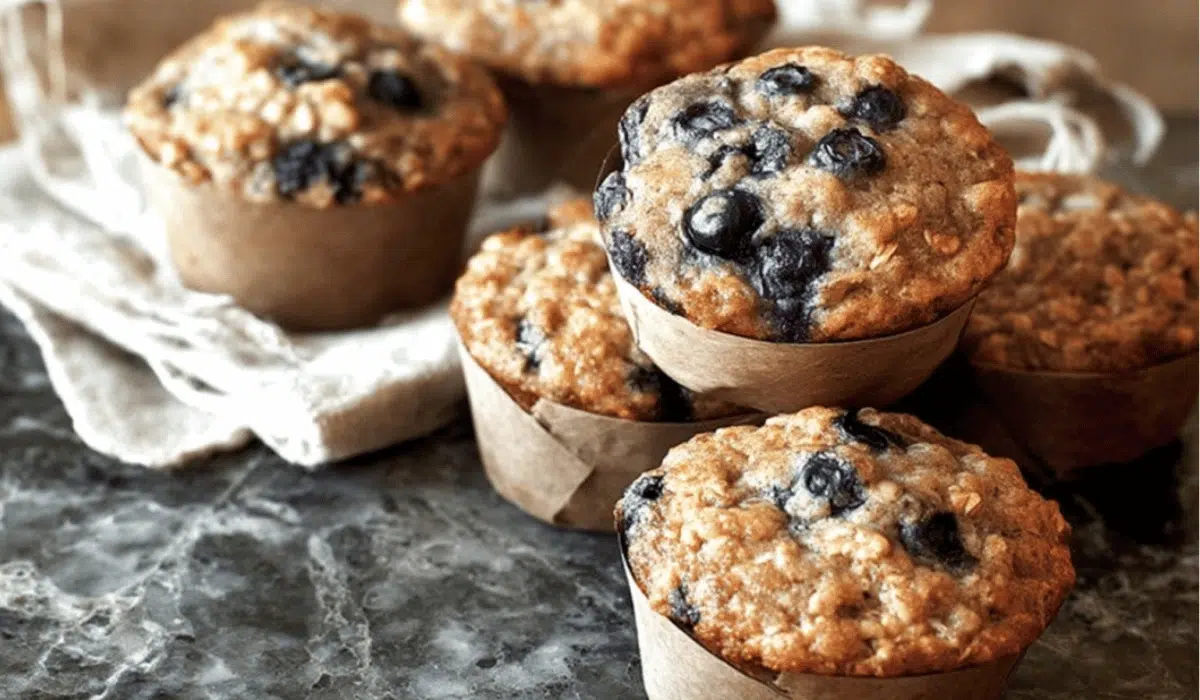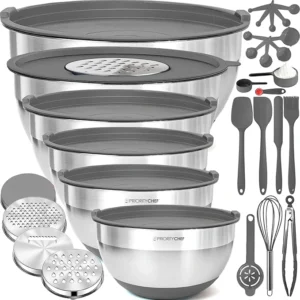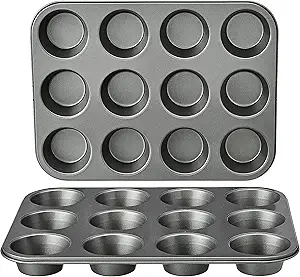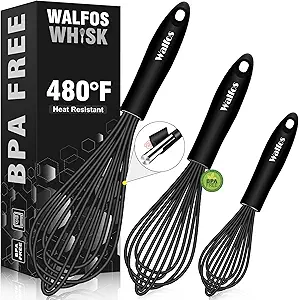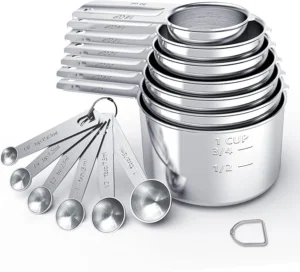There’s something deeply comforting about a warm, fluffy muffin fresh from the oven especially when it’s packed with juicy blueberries, creamy yogurt, and hearty oats. These Healthy Blueberry Yogurt Oat Muffins strike the perfect balance between wholesome and indulgent. They’re naturally sweetened, tender without being cakey, and satisfying enough for breakfast or an afternoon snack. Even better? You don’t need any special tools or skills to make them. With just one bowl and a few pantry staples, you can enjoy muffins that taste bakery-fresh with a healthy twist you’ll actually feel good about.
Table of Contents
Why You’ll Love This Recipe
You don’t need a long list of reasons to make these muffins but here are a few that matter:
- Fast and Foolproof Just stir, scoop, and bake. No fancy steps or gadgets involved.
- Sweetened with Honey No refined sugar here. Just enough natural sweetness to keep things light.
- Simple, Real Ingredients Think oats, Greek yogurt, and fresh blueberries. Ingredients you can feel good about.
- Tender, Not Crumbly These hold together perfectly but stay moist inside no dry bites or gummy middles.
- Great Any Time of Day Breakfast on the go, school lunchbox, post-workout snack, or afternoon pick-me-up.
What sets this version apart? The yogurt adds creaminess and subtle tang, while the oats bring texture without heaviness. These aren’t muffins pretending to be cupcakes. They’re the kind that taste good and feel good.
Ingredients You’ll Need
These muffins keep it simple. Every ingredient earns its place—nothing extra, nothing complicated.
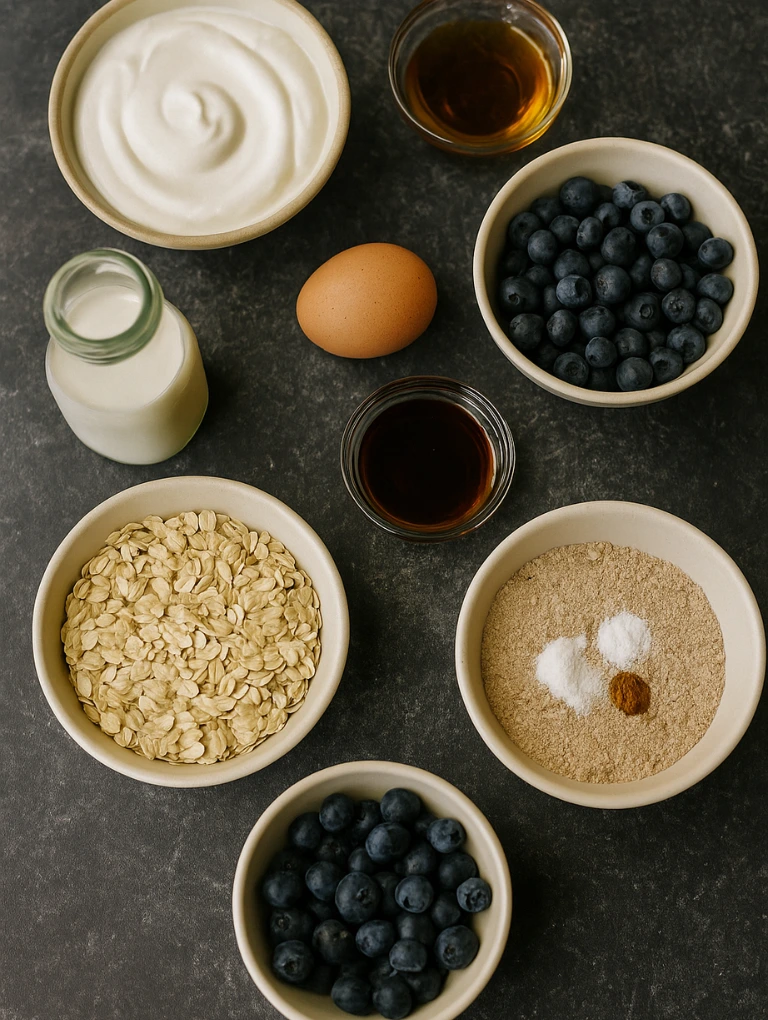
Wet Ingredients
- Greek yogurt (1 cup) Plain, full-fat or low-fat both work. It keeps the texture soft and gives a gentle tang.
- Milk (¼ cup) Use whatever you have: dairy or unsweetened plant-based are both fine.
- One large egg Adds structure and helps everything hold together.
- Vanilla (1 teaspoon) Just enough to round out the flavor.
- Honey (⅓ cup) Brings natural sweetness without being too sugary.
- Melted butter or coconut oil (¼ cup) Choose based on taste preference. Butter adds richness; coconut oil keeps it dairy-free.
Dry Ingredients
- Rolled oats (1 cup) Old-fashioned oats give texture and body.
- Whole wheat flour (¾ cup) White whole wheat gives a softer bite, but any whole wheat variety works.
- Baking powder (1 teaspoon) and baking soda (½ teaspoon) – These help the muffins rise and stay fluffy.
- Salt (¼ teaspoon) A little goes a long way to bring out the flavors.
- Cinnamon (¼ teaspoon, optional) Adds a subtle warmth if you like it.
Mix-ins
- Blueberries (1 cup) – Fresh or frozen. If frozen, don’t thaw; just fold them in straight from the freezer.
Ingredient Notes & Substitutions
- No honey? Swap with maple syrup. It changes the flavor slightly but keeps the sweetness light.
- Gluten-free? A 1:1 gluten-free baking mix works well here.
- No dairy? Use coconut yogurt and almond milk. Stick with unsweetened versions to keep the flavor balanced.
- Want a twist? Lemon zest pairs nicely with blueberries. Or fold in chopped nuts for a little crunch.
Bonus idea: If you’ve got frozen berries, toss them with a teaspoon of the dry mix before stirring them in. It helps keep them from sinking to the bottom.
How to Make Healthy Blueberry Yogurt Oat Muffins
Before you begin, make sure your yogurt and egg are at room temperature. This helps the batter mix evenly and bake up light.
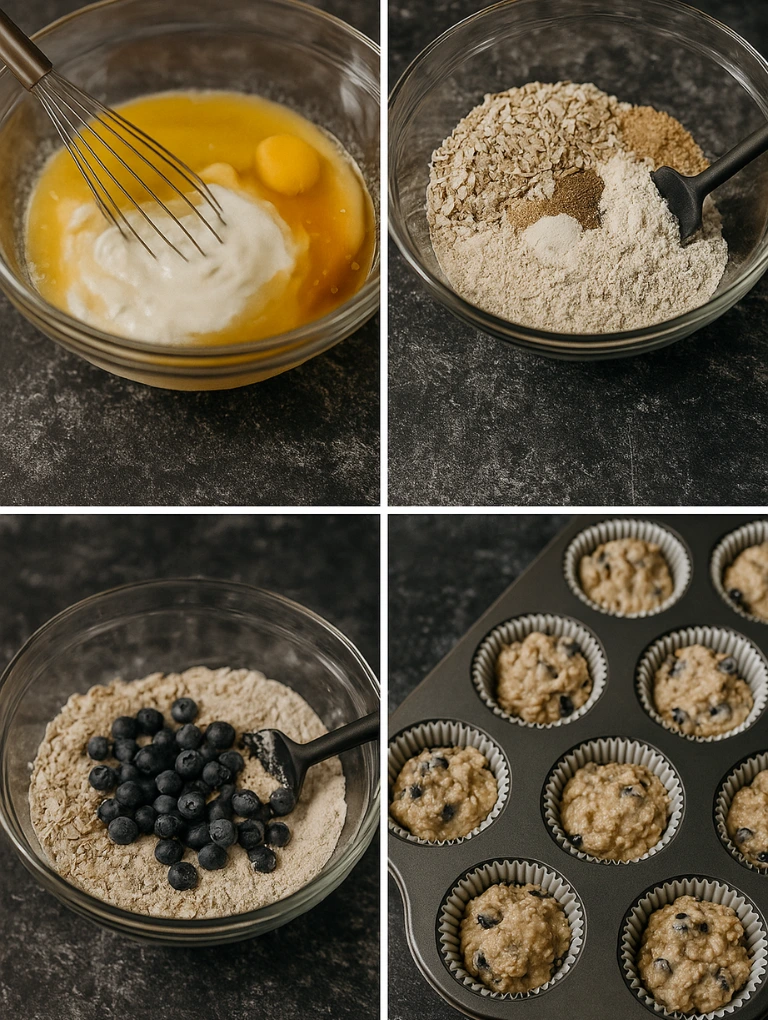
Step-by-Step Instructions
- Preheat your oven.
Set it to 375°F (190°C). If you’re using a dark-coated muffin pan or your oven tends to run hot, go with 350°F instead. Line a standard 12-cup muffin tin with paper liners or lightly grease each cup. - Combine the wet ingredients.
In a medium mixing bowl or large measuring cup, whisk together the Greek yogurt, milk, egg, vanilla, and honey. Mix until smooth and well blended. Set aside. - Mix the dry ingredients.
In a large bowl, stir together the rolled oats, whole wheat flour, baking powder, baking soda, salt, and cinnamon (if using). This step ensures the leavening agents are evenly distributed. - Add the blueberries.
Gently fold the blueberries into the dry mixture. If using frozen ones, don’t thaw them—just toss them in a spoonful of the flour mixture first to help prevent sinking. - Combine wet and dry.
Pour the yogurt mixture and the melted butter or coconut oil into the bowl with the dry ingredients. Stir with a spatula or spoon just until the dry spots disappear. The batter will be thick—resist the urge to overmix. It’s okay if it looks a little lumpy. - Scoop into the pan.
Divide the batter evenly across the 12 muffin cups. A large cookie scoop or spoon works well. Each cup should be nearly full. - Bake.
Bake for 14 to 17 minutes at 375°F. If you’re using frozen berries or your oven runs cool, you may need up to 22–24 minutes. The tops should spring back lightly when touched, and a toothpick should come out clean or with just a few moist crumbs. - Cool and enjoy.
Let the muffins rest in the pan for 5 minutes, then transfer them to a wire rack to cool completely. This prevents soggy bottoms and helps the texture set.
These muffins taste great fresh, but they also hold up well after a few days. Store them covered at room temperature, or freeze them for a grab-and-go option any day of the week.For best results, follow proper freezing and food safety guidelines from the USDA, including maintaining a freezer temperature at or below 0°F.
Pro Tips & Troubleshooting
Expert Tips for Perfect Muffins
- Use room temperature ingredients
Cold yogurt or eggs can make the batter seize or clump. Let them sit out for 15–20 minutes first. This helps everything combine smoothly and bake evenly. - Don’t overmix the batter
Stir just until the flour disappears. Overmixing leads to dense, chewy muffins not the light, moist ones we want. - Toss blueberries in dry mix
Especially if they’re frozen. This simple step keeps them from sinking to the bottom during baking. - Watch your oven
Not all ovens bake the same. Start checking your muffins around 14 minutes. If your tin is dark-coated, lower the temperature by 25°F to avoid overbrowning. - Scoop evenly
For consistent results, use a cookie scoop or measure the batter into cups. This helps them rise evenly and bake through at the same time.
Common Mistakes to Avoid
- Using too much flour
Scoop your flour with a spoon and level it off with a knife. Packing it in makes the muffins dry and heavy. - Baking at the wrong temperature
A too-hot oven can cook the outside too quickly and leave the inside underdone. Always preheat and adjust for your pan type. - Skipping the cooling time
Muffins continue to set as they cool. If you pull them out of the pan too soon, they might fall apart or get soggy bottoms. - Underbaking
Gummy centers usually mean the muffins weren’t baked long enough. If in doubt, add a couple of extra minutes and test with a toothpick.
Quick Trick: Want even more blueberry flavor? Lightly mash a few berries and swirl them into the batter before scooping. It gives a streak of color and extra fruity bites in every muffin.
Serving, Storage & Variations
How to Serve These Muffins
These muffins are best slightly warm, when the edges are just crisp and the blueberries are still soft. Pair them with:
- A smear of almond or peanut butter for extra protein.
- A dollop of Greek yogurt and drizzle of honey for a wholesome breakfast.
- Fresh fruit and coffee for a weekend brunch board.
They’re also perfect as an on-the-go snack no crumbs, no fuss.
Storage Instructions
Room Temperature:
Keep the muffins in an airtight container for up to 3 days. Lay a paper towel beneath them to catch moisture and prevent sogginess.
Refrigerator:
Store in a sealed container for up to 5 days. Bring to room temperature or microwave briefly to soften before serving.For extra assurance, refer to the USDA’s FoodKeeper app and storage chart for guidelines on baked goods.
Freezer-Friendly:
Absolutely. Wrap muffins individually in plastic wrap and freeze in a zip-top bag. They’ll stay fresh for up to 2 months.Want to understand the science behind freezing quality? See the USDA ARS’s research on advanced freezing methods and quality retention.
To Reheat:
Microwave one muffin for 20–25 seconds from the fridge, or 30–40 seconds from frozen. Or pop in a warm oven for 8–10 minutes.
Variations to Try
- Vegan Version: Use plant-based yogurt, a flax egg (1 tablespoon flaxseed meal + 3 tablespoons water), and coconut oil or vegan butter.
- Gluten-Free: Substitute with a 1:1 gluten-free baking flour and certified gluten-free oats.
- Lemon Blueberry Muffins: Add 1 teaspoon lemon zest and a few drops of lemon juice to the batter.
- No Blueberries? Swap in chopped strawberries, diced apple, or dark chocolate chips.
These swaps still keep the base recipe balanced and satisfying. Just keep an eye on baking times if you adjust moisture levels.
Nutritional Information
These muffins aren’t just tasty they’re also packed with nutrition from ingredients you likely already have in your kitchen. Here’s the breakdown for one standard muffin (based on 12 muffins per batch):
| Serving Size | Calories | Carbs | Protein | Fat | Saturated Fat | Sugar | Fiber | Sodium | Cholesterol |
| 1 muffin | 139 kcal | 21g | 4g | 5g | 3g | 10g | 2g | 178mg | 25mg |
Estimates calculated using Cronometer with standard ingredients. Nutrition will vary based on brands and substitutions.
What Makes These Muffins a Healthier Choice?
- Greek Yogurt: Adds protein and calcium without needing much oil or butter.
- Oats & Whole Wheat Flour: Provide fiber and slow-digesting carbs for steady energy.
- Honey: A natural sweetener that replaces refined sugar.
- Low in Saturated Fat: Especially if you use a plant-based fat like coconut oil.
They’re not just better than store-bought they’re better for your body.
Tip: If you change the recipe (e.g., use maple syrup instead of honey or add nuts), use a tool like MyFitnessPal or Cronometer to re-calculate based on your version.
Conclusion
These Healthy Blueberry Yogurt Oat Muffins are everything a homemade muffin should be soft, satisfying, and made with ingredients that feel good to eat. Whether you’re baking a quick batch for busy mornings or packing a few for a road trip, they offer a perfect mix of flavor, texture, and simplicity.
What makes this recipe stand out? It’s the balance: sweet but not sugary, moist without being heavy, and packed with whole grains and fresh berries. They’re freezer-friendly, kid-approved, and endlessly adaptable to your lifestyle.
Frequently Asked Questions
Are blueberry oatmeal muffins healthy?
Yes especially when made like this. These muffins use whole grain oats, Greek yogurt, and natural sweeteners like honey, which means they’re lower in sugar and higher in fiber than typical bakery muffins. They’re satisfying without being heavy and make a smart choice for breakfast or snack time.
What does yogurt do in baking muffins?
Yogurt brings moisture, structure, and a subtle tang. It also works with baking soda to help muffins rise without making them airy or dry. In this recipe, it replaces much of the fat, keeping the texture tender while boosting the protein content.
How do you stop blueberries from sinking to the bottom of muffins?
Toss the blueberries in a spoonful of the dry flour mixture before adding them to the batter. This helps the fruit “stick” in place instead of sinking during baking. Also, avoid overmixing once the berries are folded in.
Are yogurt muffins healthy?
They can be, especially when paired with whole grains and natural sweeteners. Yogurt adds protein and calcium while cutting back on the need for oil or butter. Just watch the added sugar in other recipes—this one keeps it balanced with honey.
What’s the healthiest muffin you can eat?
That depends on your goals, but a muffin like this made with whole wheat flour, rolled oats, no refined sugar, and a touch of healthy fat is a solid option. It’s nutrient-dense without being calorie-heavy, and it offers lasting energy without a sugar crash.
What kind of yogurt is best for baking?
Plain Greek yogurt works best. It’s thick, high in protein, and not overly sour. Avoid flavored yogurts, which usually contain extra sugar and artificial additives. For dairy-free versions, look for unsweetened almond or coconut-based yogurt with a similar texture.

